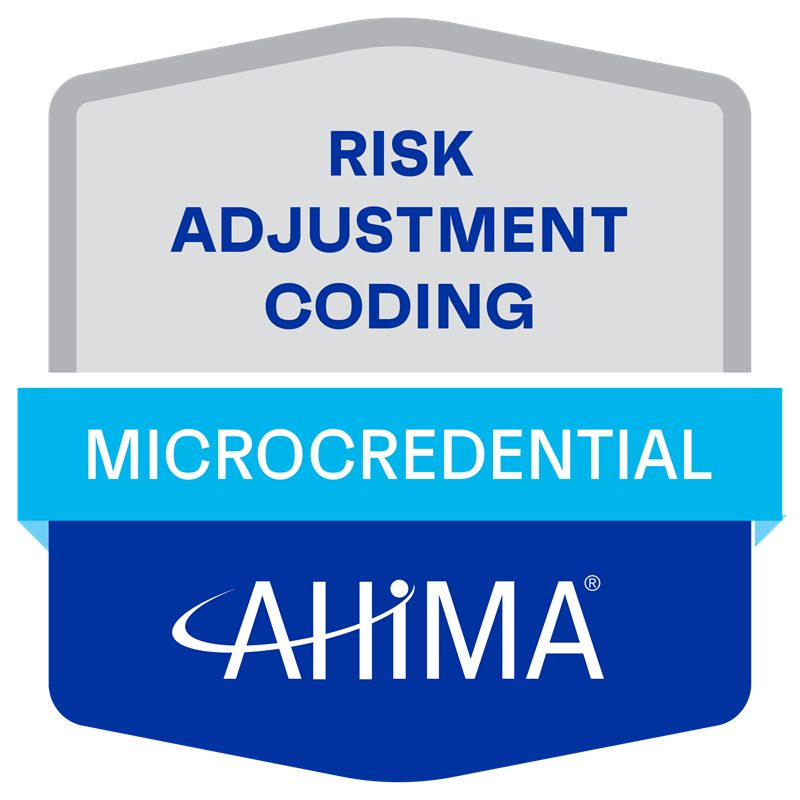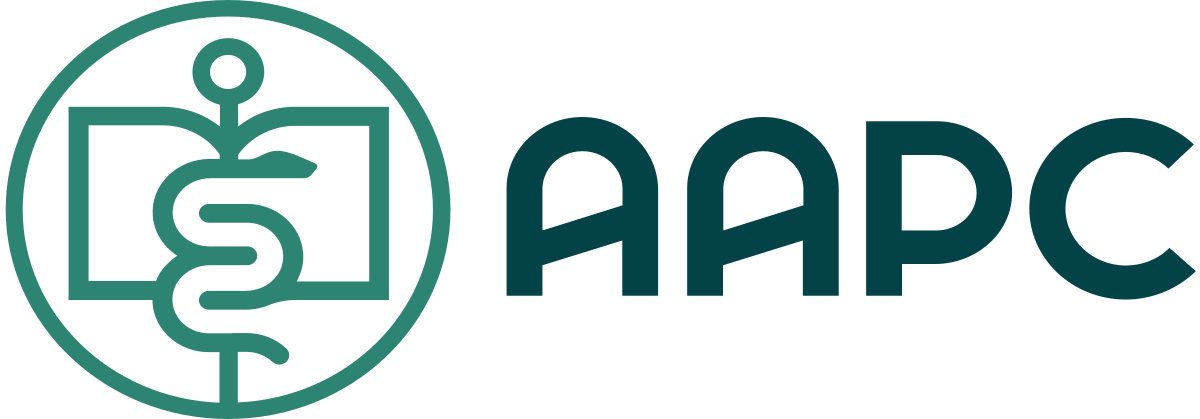
Risk Adjustment Coding (RAC)
What is a micro credential?
Why Choose Risk Adjustment Coding (RAC) Course
Expert Faculty: Learn from seasoned industry experts and AHIMA®-certified instructors who bring real-world experience and extensive knowledge to the training.
In-depth Curriculum: Gain a thorough understanding of risk adjustment methodologies, coding guidelines, documentation requirements, and regulatory compliance to accurately capture patient acuity and optimize reimbursements.
Practical Application: Emphasis on hands-on exercises, case studies, and simulations to apply knowledge to real-world scenarios, ensuring practical readiness.
Flexibility: Choose from various learning formats, including online self-paced modules and interactive virtual classes, allowing you to learn at your own convenience.
Career Advancement: Enhance your professional prospects with this specialized skill set, opening doors to new career opportunities and growth in the healthcare industry
Industry Recognition: Earn a prestigious AHIMA® certification upon successful completion, validating your expertise and setting you apart in the competitive job market.
Program Overview
The Risk Adjustment Coding (RAC) program consists of 6 modules which covers various medical terminologies, ICD-10-CM coding guidelines, Risk adjustment methodologies, documentation and compliance requirements and through understanding of Hierarchical Condition Categories (HCC) coding and auditing.
Risk Adjustment Methodology
Risk Adjustment Documentation and Compliance
Medical Terminology Anatomy
Quality or Regulatory Reform
Foundational Coding
Frequently Coded Hierarchical Condition Category (HCC) Conditions
To know more about this program
Download BrochureProgram Outcome
- Successfully demonstrate the important role of the HCC coding profession within the Risk Adjustment process in healthcare system.
- Adhere to risk adjustment compliance process within the health organization.
- Determine appropriate Hierarchical Condition Categories (HCC) diagnosis according to official coding guidelines of ICD-10-CM and Risk Adjustment process.
- Adhere to workplace policies, procedures, and professional requirements.
Key Highlights
Lesser time to obtain than a certification or degree.
Focusing on specific skillset which the employers are looking out in the market
Cost effective – Achieve your credential at a cost lower than the training fee for other certification programs.
Get a Digital Badge which will demonstrate your proficiency
Easy annual maintenance – No CEUs
Certified Coding Specialist (CCS®)
Those who code for hospital setting, must have a thorough understanding of Anatomy, physiology, medical terminology, outpatient and Inpatient coding guidelines. CCS® certification from AHIMA® helps individuals to demonstrate skills in data quality and accuracy in Inpatient and outpatient coding.
Benefits of CCS® Credential:
Proficiency in assigning accurate ICD-10-CM & ICD-10-PCS codes for diagnosis and procedures performed in Hospital setting
Ability to adapt and integrate coding and reimbursement rule changes according to regulatory & compliance
Ability to understand MS DRG, Inpatient Prospective Payment System (IPPS) and Outpatient Prospective Payment System (OPPS)
Accurately abstract data from medical records and assign codes accurately
Benefits of CCS® certified coders
Review patients’ records and assign numeric codes for each diagnosis and procedure.
Possess expertise in the ICD-10-CM, ICD-10-PCS, and CPT® coding systems.
Are versed in medical terminology, disease processes, and pharmacology concepts.

Certified Professional Coder (CPC®)
As CPC® being one of the great choices for most coders, we offer a very extensive training in CPC by our expert & certified Trainers. We ensure you get uncompromised quality training and prepare you for CPC exams by covering all the aspects in coding, mock tests and practice sessions.
Benefits of CPC® Credential:
Proficiency across various specialties in CPT coding (Evaluation & Management, Anesthesia, Surgery, Radiology, Pathology and Medicine)
Through understanding of ICD-10 coding guidelines
Knowledge in Anatomy and physiology, Medical Terminology which will help in understanding medical records and assigning codes accurately
Ability to understand medical necessity, denials, claim edits, bundling / unbundling issues in billing and charges for physicians
HCPCS coding for professional services
Certified Outpatient Coder (COC®)
The need for Outpatient coders has been on increasing trend in last few years as the physicians choosing to join hospital groups over individual practice set up. It is the right time start your career in Outpatient setting by taking up our certification training course for COC®
Passing COC® exam, one can code for Ambulatory Surgical Centers, Hospital Emergency departments, OP Diagnostic centers, Physiotherapy, Occupational Therapy & multi-specialty clinics
Benefits of COC® Credential:
-
Proficiency in accurately assigning codes for diagnosis, proedures and services performed in Outpatient setting
-
Proficiency across various specialties in CPT coding (Evaluation & Management, Anesthesia, Surgery, Radiology, Pathology and Medicine
-
Knowledge in Anatomy and physiology, Medical Terminology which will help in understanding medical records and assigning codes accurately
-
Understanding of outpatient coding guidelines, rules and regulations etc.
-
Thorough understanding of ICD-10-CM guidelines
-
Knowledge in medical necessity, denials, claim edits, bundling / unbundling issues in billing and charges
-
CMS 1500 for ASC services and UB04 for outpatient services, including applying appropriate modifiers
Certified Inpatient Coder (CIC®)
Those who earn their CIC® credential can code services rendered in Inpatient settings such as Acute care hospitals, skilled nursing facilities (SNF), Inpatient rehab facilities, Trauma care facilities, critical access hospitals (CAH) and long-term care hospitals (LTCH).
Kickstart your career in Inpatient DRG coding by passing CIC® exams which can help you earn approx. 30 – 40% more than non-certified coders
Benefits of CIC® Credential:
Proficiency in ICD-10-CM & ICD-10-PCS coding to report diagnosis and procedures performed in Inpatient setting
Expertise in medical record reviews, abstract critical patient information to code accurately
Ability to adapt and integrate coding and reimbursement rule changes to include updating the charge description master (CDM), fee updates, and the Field Locators (FL) on the UB04
Detailed understanding of Anatomy, physiology & medical terminology
Detailed knowledge in clinical indicators and disease process to accurately assign ICD-10 codes for Inpatient medical records
Understanding of Inpatient Prospective Payment System (IPPS)
Certified Risk Adjustment Coder (CRC®)
Certified Risk Adjustment Coders (CRCs®) plays a vital role in risk adjustment process by assigning appropriate diagnosis, assigning HCC codes and establishing accurate risk scores for patients.
CRC certified coders can understand chronic conditions and comorbidities of patients, apply their ICD-10-CM and Risk adjustment guidelines to help seamless payor reimbursement process
With changes in payment systems, regulatory updates the need for Risk adjustment coders are in huge. Invest in your future by taking up CRC certification which will help you build a lucrative career in Risk adjustment. CRC certified coders are compensated very well equivalent to Inpatient DRG coder for providers.
Benefits of CRC® Credential:
Detailed knowledge in reviewing and assigning accurate medical codes for diagnoses performed by physicians and other qualified healthcare providers in the office or facility setting (e.g., inpatient hospital)
Understanding of medical coding guidelines and regulations including compliance and reimbursement – allowing a CRC to understand the impact of diagnosis coding on risk adjustment payment models
Understand the complete audit & validation process for risk adjustment models
Ability to identify and communicate documentation deficiencies to providers to improve documentation for accurate risk adjustment coding
Detailed knowledge of anatomy, pathophysiology, and medical terminology necessary to correctly code Chronic conditions & co morbidities

